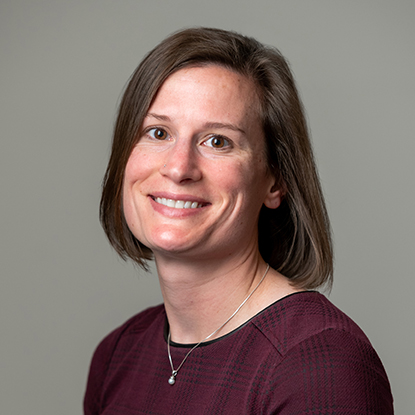Dr. Emily Clark specializes in religions in the Americas. She believes in student-centered pedagogy, regularly takes her classes into the campus archives, and is co-founder of the 91łÔąĎÍř Digital Humanities Initiative. When not teaching or researching, you can find her out running, watching soccer, or hiking with her dog.
Her award-winning first book, A Luminous Brotherhood: Afro-Creole Spiritualism in Nineteenth-Century New Orleans (University of North Carolina Press, 2016), explores the racial and religious politics of talking to the dead. Her current book project, Spiritual Matters from the Rochester Rappings to the Ouija Board, examines American Spiritualism and material culture and is under advance contract with the University of North Carolina Press. She is also the co-editor of Race and New Religious Movements in the USA: A Documentary Reader (Bloomsbury, 2019, with Brad Stoddard) and co-editor of Digital Humanities and Material Religion: An Introduction (De Gruyter, 2022, with Rachel Lindsey).
Books
A Luminous Brotherhood: Afro-Creole Spiritualism in Nineteenth-Century New Orleans, (University of North Carolina Press, 2016; paperback, 2018).
Awards: Francis B. Simkins Award 2017, Southern Historical Association
Michael Thomason Book Award 2017, Gulf South Historical Association
Outstanding Academic Title 2017, CHOICE Reviews
Race and New Religious Movements in the USA: A Documentary Reader, co-edited with Brad Stoddard (Bloomsbury Press, 2019).
Spiritual Matters: American Spiritualism and Material Culture, (under advance contract with University of North Carolina Press).
Material Religion and Digital Humanities: An Introduction, co-edited with Rachel Lindsey (under contract with De Gruyter Press).
Select Articles and Book Chapters
“Jesuit Missionaries in Early-Twentieth-Century Alaska, Colonialism, and Categories of ‘Superstition,’” Western Historical Quarterly, accepted and forthcoming 2022.
“Nineteenth-Century New Orleans Voudou: An American Religion,” American Religion 2.1 (2020): 131–155.
“The Sisters of Our Lady of the Snows: An Indigenous, Alaskan Sisterhood,” American Catholic Studies 131.3 (2020): 57–91.
“Jesuits, the Iñupiat, and Catholicism on the Seward Peninsula Coast, 1898–1937,” American Catholic Studies, 130.3 (2019), 37-66.
"'To battle for human rights': Afro-Creole Spiritualism and Martyrdom," Journal of Africana Religions, 6.2 (2018), 161–189.
"African American Religions in the 19th Century," Oxford Handbook of Religion and Race in American History, Paul Harvey and Kathryn Gin Lum, eds., (Oxford University Press, 2018), 403–419.
"Alternative Religious Movements and Race," in Oxford Research Encyclopedia of Religion in America, Vol. 2, John Corrigan, ed. (Oxford University Press, 2018), 209–228.
"," in Oxford Research Encyclopedia of American History, Jon Butler, ed., published online February 2017.
"New World, New Jerusalem, New Orleans: The Apocalyptic Art of Sister Gertrude Morgan," Louisiana History: The Journal of the Louisiana Historical Association, 55.4 (2014): 432–459.
"Creoles, Catholics, and Color Lines," Journal of Africana Religions, 2.2 (April 2014): 263–270.
"Noble Drew Ali's 'Clean and Pure Nation': The Moorish Science Temple, Identity, and Healing," Nova Religio: The Journal of Alternative and Emergent Religions, 16.3 (2013): 31–51.
"," Journal of Southern Religion, Volume 14, 2012.
Trained in American religious history, my research is interdisciplinary, archive- and narrative-driven, and seeks to unpack complicated moments in America’s past. My contribution and place in the field of American religions is being a storyteller and a critic. I am particularly interested in religious material culture, alternative spiritualities, African American religions, American Catholic history, haunting, and colonialism. Other areas of research interest include digital humanities and student-centered pedagogy.
Her research has been funded by the National Endowment for the Humanities, the Lily Foundation, the Louisville Institute, the American Academy of Religion, and the 91łÔąĎÍř University Research Council.

